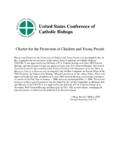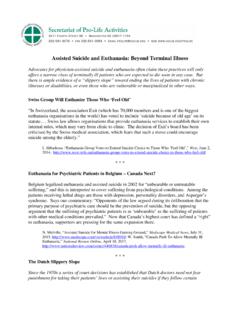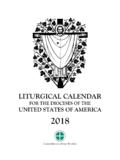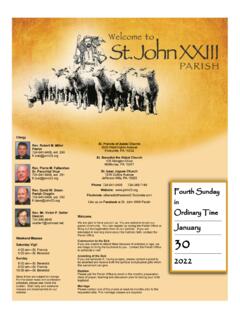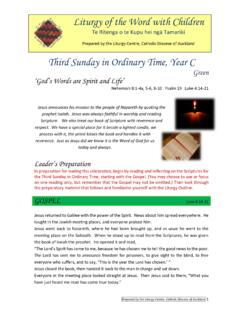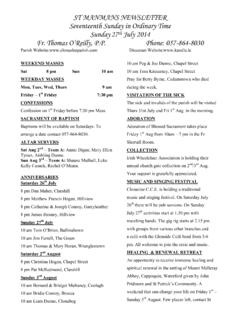Transcription of 17-028 Living as Missionary Disciples - USCCB
1 Living as Missionary Disciples . NATIONAL DIRECTORY FOR CATECHESIS WORKSHEETS. Committee on Evangelization and Catechesis United States Conference of Catholic Bishops Living as Missionary Disciples NATIONAL DIRECTORY FOR CATECHESIS WORKSHEETS. Committee on Evangelization and Catechesis United States Conference of Catholic Bishops Scripture texts in this work are taken from the New American Bible, revised edition, copyright 2010, 1991, 1986, 1970, Confraternity of Christian Doctrine, Washington, DC, and are used by permission of the copyright owner. All rights reserved. Quotes from Pope Benedict, and Pope Francis, copyright 2012, 2013, 2016, Libreria Editrice Vaticana, Vatican City State. All rights reserved. Used with permission. Quote from Pope Paul VI, Apostolic Exortation, On Evangelization in the Modern World (Evangelii Nuntiandi), quoting the National Directory for Catechesis, is taken from Vatican Council II: The Conciliar and Post Conciliar Documents edited by Austin Flannery, OP, copyright 1975, Liturgical Press, Collegeville, MN.
2 Used with permission of the publisher. All rights reserved. Quotes from the Second Vatican Council, On the Missionary Activity of the church (Ad Gentes), copyright 1965, Libreria Editrice Vaticana, Vatican City State. All rights reserved. Used with permission. Print Edition, May 2017. ISBN 978-1-60137-571-1. Copyright 2017, United States Conference of Catholic Bishops, Washington DC. All rights reserved. Contents Introduction Context and Tools to Assess and Enhance Catechetical Formation in an Evangelizing Spirit i The New Evangelization as the Context for Missionary Discipleship ii Missionary Disciples Called to Catechize iii Knowledge and Skills for the Formation of Missionary Disciples vii The Rich Harvest of Missionary Discipleship vii Ways to Use This Document viii Worksheets 1. Parish Evangelization 1. 2. Evangelization 2. 3. Six Tasks of Catechesis 3.
3 4. Inculturating the Gospel in Parish Catechetical Programs 4. 5. Catechetical Tasks in Inculturation 5. 6. Nine Criteria for Authentic Catechesis 6. 7. Divine Pedagogy and Human Methodology 7. 8. Pastor as Catechetical Leader 10. 9. Strategies for the Pastor as Catechetical Leader 11. 10. Priests: Educators in the Faith by Virtue of the Sacrament of Holy Orders 13. 11. Liturgical Catechesis 14. 12. Sacramental Catechesis 15. 13. Moral Catechesis 16. 14. Children's Catechesis (Pre-K to 4th Grade) 17. 15. Catechetical Guidelines (Grades 5 to 8) 18. 16. High School Catechetical Guidelines 19. 17. Tasks of Adult Catechesis 20. 18. Catechetical Methodology for Adults 21. 19. Parish Catechists of Children as Partners with Parents and Families 22. 20. Key Functions of the Parish Catechetical Office 23. 21. Catechist Checklist 25. Introduction Context and Tools to Assess and Enhance Catechetical Formation in an Evangelizing Spirit Ten years have swiftly flown by since the publication of the National Directory for Catechesis in 2005, years which have seen considerable growth and change within the Catholic church .
4 In these years, the Catholic church has experienced the pontificates of three popes St. John Paul II, Pope Benedict XVI, and Pope Francis and celebrated the Year of Faith, the Synod on the New Evangelization, and the Extraordinary Jubilee Year of Mercy. Pope Paul VI reawakened the church 's evangelizing mission, St. John Paul II heralded the call for the New Evangelization, and Pope Benedict XVI reproposed the encounter with the Risen Lord and the church . Pope Francis, in the document that reflected the work of the Synod on the New Evangelization, Evangelii Gaudium, situates the ministry of catechesis within the process of Missionary discipleship. By virtue of their baptism, the People of God have become Missionary Disciples . Pope Francis notes that every Christian is a Missionary to the extent that he or she has encountered the love of God in Christ Jesus: we no longer say that we are Disciples and missionaries but rather that we are always Missionary Disciples .
5 1 As catechists who herald and echo the Gospel, this witness of life should call us constantly to go forth to others out of love, to bear witness to Jesus and to talk about Jesus, to proclaim Jesus. This Missionary message is at the heart of the Gospel and was reaffirmed by the Second Vatican Council, which asserted that the pilgrim church is Missionary by her very nature, since it is from the mission of the Son and the mission of the Holy Spirit that she draws her origin, in accordance with the decree of God the Father. 2. This is clearly a time of immense possibilities for the Catholic church in the United States as new directions for evangelization, catechesis, and Missionary activity have been identified within the process of discipleship formation. The renewal of emphasis on evangelization and catechesis within the context of the new evangelization has produced many praiseworthy initiatives and efforts in the formation of youth, adults, and children.
6 As such, it has been a remarkable period for the reorientation and promotion of evangelization and catechesis within the universal church . 1 Pope Francis, Evangelii Gaudium (EG) (Washington, DC: United States Conference of Catholic Bishops, 2013), no. 120. 2 Second Vatican Council, Decree on the Mission Activity of the church (Ad Gentes), no. 2. i The New Evangelization as the Context for Missionary Discipleship The New Evangelization is the context for Missionary discipleship and begins with the encounter with Jesus. We look to Jesus, the master who personally formed his Apostles and Disciples . Christ himself teaches us how to evangelize, how to invite people into communion with him, and how to create a culture of witness: namely, through love, mercy, and joy. Christ gives us the method: Come and see (Jn 1:39); Follow me (Mt 9:9); Remain in me (Jn 15:4-6); Go therefore and make Disciples of all nations (Mt 28:19).
7 The words of Christ form the methodology for Missionary discipleship that corresponds to: Come and See Encounter*. Follow Me Accompany*. Remain in Me Community*. Go Therefore and Make Disciples of All Nations Send*. The first stage of the process is the invitation to come and see Jesus. This encounter with Christ is an invitation to a change of mind and heart, a change of life, a metanoia. This invitation to follow . Christ is the beginning of a gradual and continual process of conversion to invite all to a deeper relationship with God, to participate in the sacramental life of the church , to develop a mature conscience, to sustain one's faith through ongoing catechesis, and to integrate one's faith into all aspects of one's life. As people respond in faith and grow closer to Jesus, their communion with Jesus draws them into a deepening communion with one another and with his Body, the church .
8 In our culture, which eschews community in favor of individualism, it is essential to affirm that discipleship and communion are inseparable. This does not mean simply teaching what we have come to know but Living what we have come to believe in love, namely that Jesus Christ, by his death and resurrection, reveals and communicates to us the Father's infinite mercy. On the lips of the catechist the first proclamation must ring out over and over: Jesus Christ loves you; he gave his life to save you; and now he is Living at your side every day to enlighten, strengthen and free you.' 3 This rediscovery of the kerygma, or first proclamation, is one which should be kept at the center of all evangelizing and catechetical efforts. It is considered first, not because it exists as the beginning and then is forgotten or replaced, but because it is the principal proclamation of Jesus Christ that must be announced throughout the process of catechesis in many different ways.
9 It is the kerygma that constitutes the core work of catechesis proclaimed by Missionary Disciples . 3 EG, no. 164. * For a fully articulated treatment of this process, please see Living as Missionary Disciples : A Resource for Evangelization (Encounter, pp. 9-14, 31; Accompany, pp. 14-15, 32; Community, pp. 16-17, 32-33; Send, pp. 17-18, 33-34). ii Missionary Disciples Called to Catechize Moments of triumph as well as moments of tragedy often dramatically highlight people's need for God, who reveals himself as Father, Son, and Holy Spirit. Less dramatic circumstances and quiet everyday moments also find us reaching out for God and asking him to help us make sense of our lives where do we come from and where DID YOU KNOW? we are going and what is the meaning of our lives? Catechists, who are the church 's witnesses to God's existence, message, and loving 17,644: The number of presence, enable people in all these moments to meet the Living God Catholic parishes in the and to form a relationship that can continue to grow through a lifetime.
10 United States providing Their apostolic work springs from the Sacrament of Baptism and is ongoing catechesis. strengthened by the Sacrament of Confirmation. After initial discernment, these baptized members of Christ's Body, million: Total who identify themselves as the church , who accept a special calling from the Holy Spirit, are Catholic. affirmed and commissioned by the bishop and his delegates to serve the church through the ministry of catechist. Their vocation requires Two-thirds: Percent cultivation and maturation of human gifts and talents, deepening of Catholic children in spirituality, faith knowledge, and catechetical skills, and a passion the United States who for Living and sharing the Good News with people of all ages and depend upon catechists circumstances. Catechists know that they can count on the Holy Spirit in parish-based programs to continue to be with them and to prompt them with just the right to provide their words to say as his faithful witnesses.






